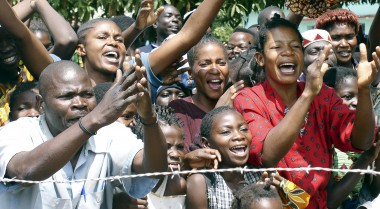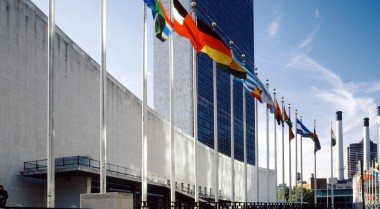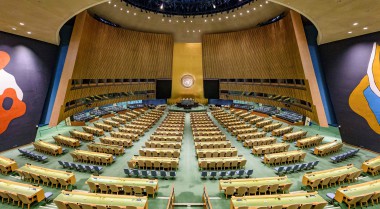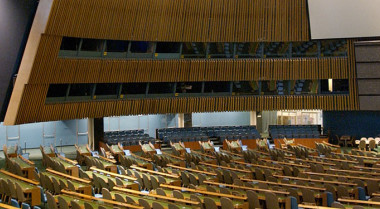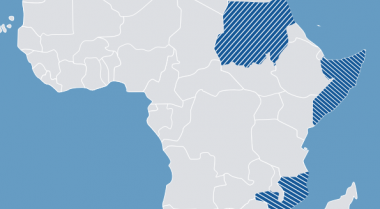
Sustaining Peace Roundtable Series
GPPAC, in collaboration with the Dag Hammarskjöld Foundation (DHF) and the Global Network of Women Peacebuilders (GNWP), has initiated a series of roundtable discussions on Operationalizing Sustaining Peace, bringing together experts to discuss the implementation of the Sustaining Peace resolutions.
While normative commitments to sustaining peace have been materialised in the UN's 2016 Sustaining Peace Resolutions, the practical operationalisation of these commitments at the national and regional level remains a common challenge and opportunity for multi-stakeholder dialogue. The 2020 Peacebuilding Architecture Review further supported the need to move away from normative support towards an action that produces an impact on the ground. In 2020, a consensus was reached that international policy and practice must focus on the implementation of the UN Peacebuilding Sustaining Peace resolutions and the achievement of concrete results at regional and country levels.
The ongoing exploration of the ways Sustaining Peace can become a reality at the field level is where the initiative for the Sustaining Peace Roundtable Series was born. The Roundtable Series aims to support the practical implementation of the Sustaining Peace Agenda by bringing together experts in the field from civil society, member states, UN agencies, Funds and programs, and the UN Secretariat.
In this collective learning space, the discussions contribute to the formulation of a shared practical understanding of the Sustaining Peace Agenda and the exploration of ongoing efforts to move the agenda forward, as well as potential efforts, strategies, and pathways towards the implementation and full realisation of the Sustaining Peace resolutions.
An overview of the roundtable discussions to date:
- 31 October 2024 | Strengthening the impact of the Peacebuilding Commission at the field level - ideas and opportunities for the 2025 Peacebuilding Architecture Review (Meeting from the 20th Expert Level Discussion)
This summary note explores ideas, viewpoints and pathways for the Commission to continue supporting nationally-led efforts and strategies to prevent conflict and sustain peace, as well as ways to strengthen linkages between the UN peacebuilding architecture and the work of UN Country Teams.
- 18 September 2024 | Operationalising Sustaining Peace: Lessons Learned from the Sustaining Peace Roundtable Series Recommendations for the 2025 Peacebuilding Architecture Review (Submission)
This submission aims to support Member States in identifying key priorities to be discussed during the formal phase of the 2025 PBAR. It draws on and synthesises the findings of the Operationalising Sustaining Peace roundtable series between 2021 and 2024 to support the continued operationalisation of peacebuilding and sustaining peace.
- 25 July 2024 | National Prevention Strategies: How Can the UN Peacebuilding Commission Provide Support? (Meeting Note from the 28th Expert Level Discussion)
This summary note discusses opportunities and challenges for the Peacebuilding Commission to facilitate the exchange of good practices, coordinate support, and mobilise funding for national prevention strategies.
- 16 May 2024 | Looking Ahead to the 2025 Peacebuilding Architecture Review: Exploring Innovative Approaches to assess the Implementation of Peacebuilding and Sustaining Peace (Meeting Note from the 27th Expert Level Discussion)
This summary note explores innovative options for and approaches to carrying out the 2025 PBAR.
- 1 February 2024 |2024 in Preview: How to Leverage the Summit of the Future and Peacebuilding Architecture Review to Strengthen the Implementation of Peacebuilding and Sustaining Peace? (Meeting Note from the 26th Expert Level Discussion)
This summary note explores opportunities to connect the Summit of the Future and the 2025 Peacebuilding Architecture Review.
- 30 August 2023 | What is after the New Agenda for Peace? Assessing opportunities and next steps for the Peacebuilding Commission (Meeting Note from the 25th Expert Level Discussion)
This summary note focuses on the recommendations in the New Agenda for Peace for the UN intergovernmental bodies, specifically the Peacebuilding Commission, and identifying avenues available and support needed to continue and bolster global action for the promotion of sustaining peace and conflict prevention.
- 16 June 2023| Lessons Learned from the Peacebuilding Commission's Work: The Impact of Political Accompaniment at the Country Level (Meeting Note from the 24th Expert Level Discussion)
This summary note takes a closer look at the impact of the Peacebuilding Commission’s work at the country level. More specifically, the political accompaniment role of the Commission and how it can support national peacebuilding processes through its unique position within the UN system.
- 14 February 2023 | How can integrated climate responses contribute to sustaining peace: The role of the Peacebuilding Commission? (Meeting Note from the 23rd Expert-Level Discussion)
This summary note explores the unique role of the Peacebuilding Commission in bringing together a wide range of stakeholders representing these two broad agendas to promote conflict- and gender-sensitive climate mitigation and adaptation work within the UN system.
- 13 December 2022 | Building Peace Regionally: What does the UN Peacebuilding Leadership look like at the Regional Level? (Meeting Note from the 22nd Expert-Level Discussion)
This summary note analyses the support and contribution of the UN to regional peacebuilding. Member States, regional organisations, civil society, and the UN shared reflections and ideas for building partnerships and strengthening financing for action.
- 13 October 2022 | The Evolution of the Role of the Peacebuilding Commission: Strengthening Financing for Peacebuilding through Convening and Political Accompaniment (Meeting Note from the 21st Expert-Level Discussion)
This summary notes outlines opportunities for the Peacebuilding Commission to support financing for peacebuilding through its advisory, bridging and convening mandate; through partnerships, and engagement with civil society.
- 20 April 2022 | Building Peace across the United Nations: The Advisory Role of the Peacebuilding Commission (Meeting Note from the 20th Expert-Level Discussion)
This summary note explores how the Peacebuilding Commission can utilize its advisory and bridging roles to convene UN bodies beyond the Security Council, as well as non-UN entities.
- 3 February 2022 | Operationalization of Peacebuilding and Sustaining Peace: Donors’ Support and Coordination at the Country Level (Meeting Note from the 19th Expert-Level Discussion)
This summary note unpacks some of the good practices and lessons learned from existing efforts to advance donor coordination at the country level.
- 27 October 2021 | At the crossroads of Climate, Gender and Sustaining Peace: What is the role of the UN peacebuilding architecture? (Meeting Note from the 18th Expert-Level Discussion)
This summary note outlines concrete recommendations for addressing the nexus between climate, gender and sustaining peace.
- 26 May 2021 | Investing Smarter: Assessing structural transformation in financing for impactful peacebuilding (Meeting Note from the 17th Expert-Level Discussion)
This summary note outlines concrete recommendations for strengthening quality financing for peacebuilding.
- 23 March 2021 | UN Leadership for Sustaining Peace at the country level: Expectations and realities (Meeting Note from the 16th Expert-Level Discussion)
This summary note provides key recommendations for enhancing efforts to improve leadership, accountability and capacities across the UN system.
- 2 February 2021 | Implementation of Peacebuilding and Sustaining Peace: What comes after Resolution 2558 (2020)? (Meeting Note from the 15th Expert-Level Discussion)
This summary note captures key reflections as well as ideas on the next steps in the implementation of the Peacebuilding and Sustaining Peace agenda.
- Operationalising Sustaining Peace: Learning from the Sustaining Peace Roundtable Series (Final Recommendations)
This summary note describes the key takeaways from the Roundtable Series discussions in 2019 and 2020.
- 3 December 2020 | Financing Inclusive Peacebuilding: Strengthening Locally-Informed Innovative Solutions for Sustaining Peace (Meeting Note from the 14th Expert-Level Discussion)
This summary note outlines various obstacles that local civil society organizations encounter when seeking funding, and provides concrete recommendations towards financing inclusive local peacebuilding.
- 27 October 2020 | No Peace Without Us: How does the UN Peacebuilding Architecture internalize the Women, Peace and Security Agenda? (Meeting Note from the 13th Expert-Level Discussion)
This meeting note highlights the inherent link between the two distinct transformative frameworks of the WPS Agenda and Sustaining Peace Resolutions.
- 30 September 2020 | Building and sustaining an inclusive peace: The role of local civil society and community engagement in operationalizing the Sustaining Peace agenda and ensuring that no one is left behind (Meeting Note from the 12th Expert-Level Discussion)
This meeting note explores challenges in inclusive community engagement as well as the way meaningful partnerships can bring tangible impact at the country and community level.
- 16 June 2020 | Building Capacities for Prevention and Sustaining Peace at the Country Level: What can the UN Peacebuilding Architecture learn from the COVID-19 pandemic? (Meeting Note from the 11th Expert-Level Discussion)
This meeting note outlines good practices and lessons learned from the UN system’s efforts to address the COVID-19 pandemic.
- 17 April 2020 | Investing in sustainable peace: Current landscape and the way forward on financing for conflict prevention, peacebuilding and sustaining peace (Meeting Note from the 10th Expert-Level Discussion)
This meeting note highlights the need for flexible funding modalities and local ownership in the COVID-19 response.
- 6 March 2020 | Policy Coherence Through Meaningful Inclusion: The Key Priorities Ahead of the 2020 Peacebuilding Architecture Review (Meeting Note from the 9th Expert-Level Discussion)
This meeting note presents key takeaways to ensure policy coherence drawing from an integrated approach to policy-making.
- 29 January 2020 | Looking Ahead: The 2020 UN Peacebuilding Architecture Review (Meeting Note from the 8th Expert-Level Discussion)
This meeting note summarises reflections on planning for the 2020 Review as well as expectations for and perspectives on the process.
- 5 December 2019 | Advancing the Nexus of Human Rights and Peacebuilding (Meeting Note from the 7th Expert-Level Discussion)
This meeting note examines opportunities for further aligning perspectives and advancing the nexus of human rights and peacebuilding with a particular emphasis on human rights mechanisms.
- 24 October 2019 | Women as the pioneers in conflict prevention and peacebuilding: The linkages between Sustaining Peace and the Women, Peace and Security (WPS) (Meeting Note from the 6th Expert-Level Discussion)
This meeting note discusses the progress achieved in the implementation of the WPS agenda, and the lessons from it, can be used to inform and strengthen the operationalization of sustaining peace.
- 24 September 2019 | Building Strategic Partnerships for Sustaining Peace at the Regional Level (Meeting Note from the 5th Expert-Level Discussion)
This meeting note identifies strategies to operationalize the Peacebuilding and Sustaining Peace resolutions at the regional level and the roles of regional actors, including regional intergovernmental organizations, in implementing them.
- 30 May 2019 | The UN Development System Reform and Sustaining Peace: Realities and Opportunities (Meeting Note from the 4th Expert-Level Discussion)
This meeting note assesses the progress in the ongoing reform of the UN Development System and the implications of and opportunities from this process for the operationalization of the UN’s Peacebuilding and Sustaining Peace resolutions.
- 1 March 2019 | Young people as drivers of peace – the role of the Youth, Peace and Security agenda in building and sustaining peace (Meeting Note from the 3rd Expert-Level Discussion)
This meeting note highlights the role of youth as peacebuilders and leaders in sustaining peace, and the synergies between the implementation of the UN’s Peacebuilding and Sustaining Peace approach, and the Youth, Peace and Security (YPS) agenda.
- 30 January 2029 | Pathways for Peace and Sustaining Peace: Aligning the two processes of implementation (Meeting Note from the 2nd Experts-Level Discussion)
This meeting note outlines ways the Sustaining Peace agenda could promote a necessary change in the way the international community supports national governments in identifying and addressing risks for an escalation or eruption of violent conflict.
- 6 December 2018 | How Do We Understand the Operationalization of Sustaining Peace? Glancing Backward before Moving Ahead (Meeting Note from the 1st Expert-Level Discussion)
This meeting note reflects on what has been achieved over the past year and stimulated discussion on what actions and adjustments in policy and practice can and should be expected in countries, regional organizations, and UN headquarters.
For more information, please reach out to our UN Liaison, Marina Kumskova, (un.liaison@gppac.net).

